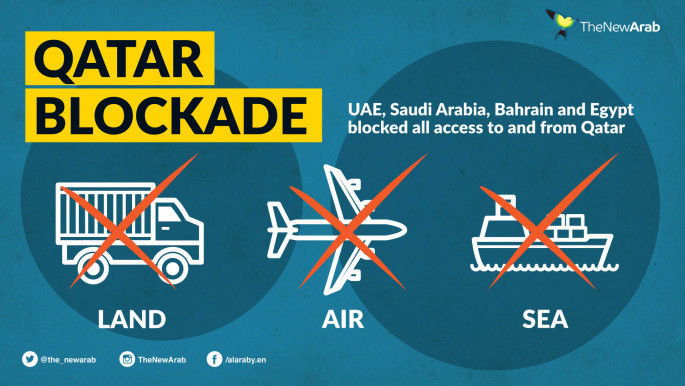Gulf crisis breakthrough? Date set for Gulf Cup that could see Saudi team in Qatar
A date has been set for the Arabian Gulf Cup in Qatar, a football tournament that will see teams from Saudi Arabia, the United Arab Emirates, and Bahrain taking part, which some analysts have seen as a sign the Gulf crisis could be thawing.
The eight country football tournament will take place between 26 November and 8 December, Al Jazeera sports journalist Andy Richardson reported.
A new draw will take place Thursday to determine the groups for the tournament in Qatar, which is currently under blockade by its neighbours.
Saudi Arabia, the UAE and Bahrain imposed a sea, land and air blockade of Qatar in June 2017 accusing it without evidence of having ties to radical groups, allegations which Doha has repeatedly denied.
The same three countries will now be in attendance at the Gulf Cup, along with Iraq, Kuwait, Oman and Yemen, suggesting to many that tensions could be easing between the rival Gulf powers especially if fans from these countries are allowed by their governments to fly to Qatar for the tournament.
Writer Jaber al-Harami told The New Arab's Arabic-language service that there are real signs at the moment there could be a breakthrough, with sports as a vehicle to resolving the crisis.
 |
Harami sees a way out of the current deadlock by the next Gulf summit, scheduled to be held in the UAE in December, but believes the first step must be to re-open the borders with Qatar and lift the siege on the emirate.
Academic and former advisor to the UAE's crown prince Abdulkhaleq Abdulla tweeted: "I can share with you that there have been important developments in resolving the Gulf dispute sooner than expected," without specifying further details.
If Saudi Arabia, UAE and Bahrain team members - and fans - take direct flights from their home countries to Doha then this will effectively break the blockade.
When asked about this, Harami said: "Sports fans may be the key to opening the borders and ending the siege."
Qatar's Minister of Foreign Affairs Mohammed bin Abdulrahman Al-Thani said Tuesday, after a meeting with the US Secretary of State in Washington, that the meeting touched on the Gulf dispute and the Gulf Cooperation Council (GCC) comprising Qatar, Saudi Arabia, the UAE, Bahrain, Kuwait and Oman.
|
"Qatar appreciated America's efforts to preserve the unity of the GCC and to return it back to what it used to be," he said.
He added that Kuwait's mediation efforts in the Gulf crisis are still ongoing and that Kuwaiti officials had recently visited Saudi Arabia and Qatar.
Last month, the emir of Kuwait told MPs that the 30-month dispute between Qatar and Gulf countries is no longer acceptable and must be resolved.
Addressing the opening session of the Kuwaiti parliament's new term, Sheikh Sabah said the Saudi-led boycott has greatly weakened the unity of the six-nation GCC.
"It is no longer acceptable or bearable for the dispute that erupted between our GCC brethren to continue," Sheikh Sabah, 90, told parliament in his first public appearance since travelling abroad for medical treatment in early September.
Sheikh Sabah, who has been acting as a mediator to resolve the dispute, said the "row has weakened our capabilities and threatened our achievements", calling for a negotiated solution.
The emir also called for national unity in the face of regional developments and protests in several Arab countries.
Qatar's successful bid to host the 2022 World Cup has been a cause of bitter envy among Gulf rivals, with many suspecting the Saudi-blockade was in part designed to disrupt preparations for the prestigious global tournament.
Qatar delivered a humiliating blow to the UAE after winning the tournament in the UAE following a remarkable record-breaking run that saw the team concede just one goal.
Read more: GCC – A glimmer of hope or condemned to history?
Not a single senior UAE official was present medals to the victorious Qatar football team in the closing ceremony of the Asian Cup 2019 .
The 2017 Arabian Gulf Cup was due to be held in Qatar but was moved to Kuwait in the aftermath of the blockade.
Shortly after the blockade was imposed, Saudi Arabia gave Kuwait a list of 13 demands to pass on to Doha, which included shuttering media outlers such as Al Jazeera and The New Arab.
Qatar rejected these, saying that they violated its sovereignty and aimed to impose hegemony on it. The blockade has been largely ineffective.
Follow us on Twitter and Instagram to stay connected

![Palestinians mourned the victims of an Israeli strike on Deir al-Balah [Getty]](/sites/default/files/styles/image_684x385/public/2024-11/GettyImages-2182362043.jpg?h=199d8c1f&itok=xSHZFbmc)


![The law could be enforced against teachers without prior notice [Getty]](/sites/default/files/styles/image_684x385/public/2178740715.jpeg?h=a5f2f23a&itok=hnqrCS4x)
 Follow the Middle East's top stories in English at The New Arab on Google News
Follow the Middle East's top stories in English at The New Arab on Google News

![Palestinian journalists in West Bank [Getty]](/sites/default/files/styles/image_330x185/public/2167088057.jpeg?h=a5f2f23a&itok=smdkN-46)
